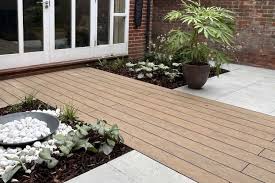When it comes to creating a stunning and functional outdoor living space, the choice of decking material is crucial. Two of the most popular options on the market are teak and composite decking, each offering its own unique set of advantages. In this comprehensive article, we’ll dive deep into the world of teak vs composite decking, helping you uncover the ultimate solution for your backyard oasis.
Understanding Teak Decking
Teak is a tropical hardwood known for its exceptional durability and natural resistance to weathering, moisture, and pests. Hailing from the forests of Southeast Asia, teak has long been revered for its rich, golden-brown hue and its ability to withstand the test of time.
Advantages of Teak Decking
Longevity: Teak is renowned for its exceptional longevity, with a lifespan of up to 50 years or more when properly maintained.
Resistance to the Elements: Teak’s natural oils make it highly resistant to UV radiation, moisture, and insect infestations, ensuring your deck looks great for years to come.
Low Maintenance: Compared to other hardwoods, teak requires minimal maintenance, with occasional oiling or cleaning to maintain its luster.
Unique Aesthetic: The rich, warm tones of teak create a classic, elegant look that complements a variety of outdoor design styles.
Potential Drawbacks of Teak Decking
Cost: Teak is generally more expensive than other decking materials, making it a significant investment for home owners.
Weight: Teak is a dense, heavy wood, which can make installation and transportation more challenging.
Sustainability Concerns: The increasing demand for teak has led to concerns about sustainable harvesting practices in some regions, which is an important consideration for environmentally conscious consumers.
Exploring Composite Decking
Composite decking is a synthetic material made from a blend of wood fibers and plastic polymers. This innovative solution has gained widespread popularity in recent years due to its low-maintenance and environmentally friendly features.
Advantages of Composite Decking
Durability: Composite decking is highly resistant to weathering, fading, and damage from insects or rot, making it a long-lasting choice for outdoor spaces.
Low Maintenance: Unlike traditional wood, composite decking requires minimal upkeep, with no need for regular staining, sealing, or refinishing.
Versatility: Composite decking comes in a wide range of colors and textures, allowing for greater design flexibility to complement your outdoor aesthetic.
Eco-Friendly: Many composite decking products are made from recycled materials, making them a more sustainable option compared to traditional wood.
Potential Drawbacks of Composite Decking
Artificial Appearance: Some homeowners may find the synthetic appearance of composite decking less appealing than the natural look of wood.
Heat Absorption: Composite decking can absorb more heat than traditional wood, which may be a concern in hot climates.
Limited Lifespan: While highly durable, composite decking may not have the same longevity as high-quality hardwoods like teak.
Comparing Teak and Composite Decking
Now that we’ve explored the individual merits of teak and composite decking, let’s take a closer look at how they stack up against each other.
Durability and Weathering Resistance
Teak: Teak is renowned for its exceptional durability and natural resistance to weathering, moisture, and pests, making it a long-lasting choice for outdoor decking.
Composite: Composite decking is also highly durable and resistant to weathering, with the added benefit of being immune to rot, insects, and other common wood-related issues.
Maintenance and Upkeep
Teak: Teak requires minimal maintenance, with occasional oiling or cleaning to maintain its natural luster.
Composite: Composite decking is the clear winner in terms of low maintenance, as it requires no staining, sealing, or refinishing.
Aesthetic Appeal
Teak: The rich, warm tones of teak create a classic, elegant look that many homeowners find visually appealing.
Composite: Composite decking offers a wider range of color and texture options, allowing for greater design flexibility to match your outdoor aesthetic.
Cost
Teak: Teak is generally more expensive than composite decking, with higher upfront costs for the material and installation.
Composite: Composite decking is typically more affordable than teak, making it a more budget-friendly option for many homeowners.
Sustainability
Teak: The increasing demand for teak has raised concerns about sustainable harvesting practices in some regions, which is an important consideration for environmentally conscious consumers.
Composite: Many composite decking products are made from recycled materials, making them a more sustainable choice compared to traditional wood.
Choosing the Right Decking Solution for Your Needs
When it comes to selecting the ultimate decking solution, there is no one-size-fits-all answer. The choice between teak and composite decking ultimately depends on your personal preferences, budget, and the specific requirements of your outdoor space.
Key Considerations:
Durability and Lifespan: If you’re looking for a long-lasting, low-maintenance solution, teak or composite decking may be the best fit.
Aesthetic Preference: Do you prefer the natural, warm tones of teak or the wider design flexibility of composite decking?
Environmental Impact: Consider the sustainability of the decking material and how it aligns with your values.
Budget: Weigh the upfront costs of teak versus the more affordable composite decking options.
Conclusion
When it comes to uncovering the ultimate decking solution, the choice between teak and composite decking ultimately comes down to your individual needs and preferences. Both materials offer unique advantages and drawbacks, so it’s essential to carefully consider your priorities and make a decision that will enhance the beauty and functionality of your outdoor living space for years to come.
Whether you’re drawn to the timeless elegance of teak or the low-maintenance appeal of composite decking, researching and understanding the key factors can help you make an informed decision that will provide you with the perfect backdrop for your outdoor adventures.
Also Read:
Luxury Redefined – DesignMode24 Interior Design
Win Free Gifts from Give away look whatmomfound
What Is Mom Life Famousparenting? – The Real vs. Reel Edition


